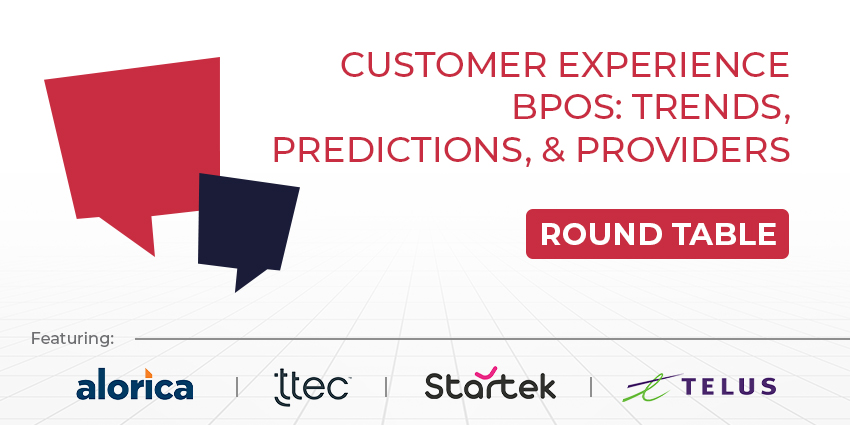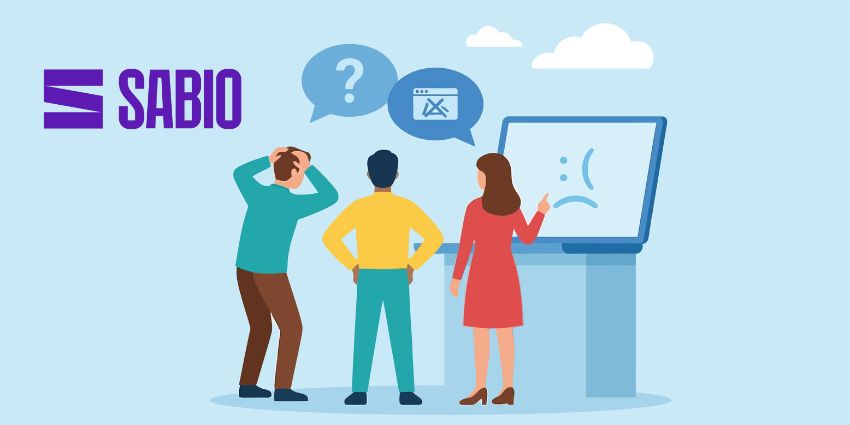BPOs are under pressure. That’s the narrative swirling the CX space over the past 12 months.
For many, generative and agentic AI technologies pose a significant challenge.
Yet, there’s also an opportunity to embrace them, integrate them into their offerings, and commercialize them in a way that delivers added value to the customer experience.
Many BPOs are doing this while managing more high-value transactions that can’t simply be automated away.
Against that backdrop, experts from four prominent BPOs participated in this month’s roundtable. They are:
- Max Schwendner, Co-CEO of Alorica
- John Abou, President of TTEC Engage
- Gurpal Singh, Global Chief Operating Officer at Startek
- Jamie Timm, Chief Delivery Officer at TELUS Digital Solutions
Below, they dive into key industry trends and predict the market’s future.
Customer Experience BPOs: The Trends
Unsurprisingly, one topic dominates: AI. Yet, each expert offers a different take.
Clients No Longer View AI as a Human Replacement
Schwendner: While it is a catchy news headline, our clients no longer view AI as replacing humans. Instead, it’s becoming a force multiplier that supercharges agents with real-time insights, predictive guidance, sentiment analysis, and multilingual capabilities.
The blend of human + AI sets a new standard for speed, accuracy, and personalization in customer interactions.
At Alorica, we’re investing across this spectrum – be it conversational AI with emotional awareness, real-time voice language translation, new ways of handling digital trust & safety, and many others.
Clients Are Taking a Staged, More Thoughtful Approach to AI
Abou: Implementing AI in a dynamic customer experience environment is much harder than many originally thought.
A year ago, companies rushed in thinking it was a plug-and-play solution. What we, at TTEC, are now seeing, and what we hear consistently from clients, is that AI requires far more than a switch-on. It needs clean data, curated knowledge bases, new operating models, and clear guardrails.
Many businesses are pausing, even walking back, to build the right foundations before scaling.
The trend is less about racing to deploy AI and more about taking a staged, thoughtful approach, building strong foundations so that AI enhances associates’ work and improves customer experiences rather than creating new frustrations.
BPOs Are Becoming More Strategic Partners
Singh: Hybrid AI–human operations are moving from pilots to production. Agent copilots, real-time guidance, and automated after call work (ACW) are proving effective at reducing cognitive load, shrinking time to proficiency, and improving consistency across teams.
It’s not bots versus people; it’s orchestration. Automation handles repetitive steps, surfaces context, and flags risk; people bring empathy, judgment, and brand voice to resolve nuanced situations and strengthen loyalty.
Signal-driven operations enable proactive care. Early warning indicators and intent detection trigger outreach before a ticket exists, reducing avoidable contacts and protecting revenue.
BPOs are boosting these strategies, ensuring responsible design becomes operational. Governance, data security, and explainability are embedded into playbooks and QA, ensuring compliant scale without sacrificing customer trust.
Agentic AI Is Transforming the BPO Space
Timm: Unlike GenAI assistants that require user prompts, agentic AI assistants act autonomously, setting their own tasks based on goals.
The technology has significant internal applications for BPOs, from streamlining repetitive and routine workflows, tasks, and decisions to providing live coaching and support for human agents.
Specifically, agentic AI can perform repetitive tasks such as data entry or updating CRM records, and routine decisions like classifying tickets, routing calls, and applying compliance checks.
Also, it proactively manages workflows by monitoring queues, predicting workload spikes, and suggesting staffing adjustments.
Agentic AI applications enable BPOs to move beyond reactive support toward proactive engagement, anticipating customer needs, resolving issues before they surface, and offering timely recommendations.
Finally, this is not about replacing humans, but instead enabling them to focus on what they do best. The future of CX is autonomous, intelligent, and above all, human.
Customer Experience BPOs: The Predictions
From rising contact volumes to a change in the term “contact center”, the experts give their CX predictions and how they’ll impact BPOs.
Customer Engagements Will Rise Because of AI
Schwendner: Transactions will increase as a function of AI, not decrease.
As AI enables a greater degree of personalization and ideally, satisfaction with companies, their customers will request and require even more interactions and data points than ever.
As counterintuitive as this sounds, it’s actually something we’ve seen before – be it IVR, chatbots, or any other technological intervention, once implemented both the number of interactions and the complexity of those interactions will increase.
Clients That Embrace Predictive & Proactive CX Engines Will Win
Abou: Contact centers sit at the crossroads of every customer interaction, gathering invaluable data on behaviors, preferences, and pain points.
With the right AI-driven analytics, that intelligence will fuel everything, from how brands service customers, grow revenue, manage supply chains, and shape future products.
With that backdrop, here’s the prediction: the future of customer experience will be defined by the ability to anticipate customer needs and deliver seamless technology-enabled experiences that feel human even when they are not.
The companies who win will be those who turn their CX operations into predictive, proactive engines of growth, anticipating customer needs, solving problems before they arise, and building trust through authentic, empathetic interactions.
Customers will expect companies to understand them so well that brands proactively solve problems before they arise.
AI can deliver the intelligence, but the real advantage lies with organizations that balance it with an authentic human connection.
Contact Centers Become Experience Control Rooms
Singh: Forget the term “contact center”, embrace “experience control rooms”. In these control rooms, associates work with copilots, most non‑value tasks are automated, and leaders manage by early signals to predict, prevent, and then resolve issues.
That’s the headline. But, here are three more takes:
- Success Metrics Will Shift – Beyond handle time, clients will prioritize effort reduced, emotion managed, and revenue protected, aligning incentives to outcomes that matter for customers, employees, and the business.
- Journeys Turn Event‑Driven and Proactive – Triggered interventions and next‑best‑action engines orchestrate care across channels, reducing friction and strengthening retention at key moments.
- Commercial models evolve – Outcome‑based partnerships expand, tying fees to retention, NPS, or revenue protection; sustainability and ethical CX weigh as strongly in partner choice as price.
Expect Challenges Before Realizing Long-Term AI Benefits
Timm: While AI holds tremendous promise, there will be transition period before it is fully integrated, which could bring challenges before its long-term benefits are fully realized.
Today, there’s a proliferation of niche, AI-based tools that, although helpful, add complexity to the agent desktop, alongside unifying platforms that bring together multiple data feeds.
The ultimate goal is to provide a single pane of glass that gives agents a clear, consolidated view of the customer, the tools to act, and real-time insights to guide them.
Over time, AI will manage many interactions, with human agents intervening where higher judgment is required and increasingly taking on “managing the agent” responsibilities.
Companies must invest in continuous training and upskilling so agents can apply AI expertise and human judgment effectively.
Customer Experience BPOs: The Providers
The customer experience BPO market is jam-packed with possible providers. Below, the four experts highlight what differentiates their brands.
Alorica
Schwendner: Alorica was built and is run by incredibly passionate people with three objectives:
- Performance – At Alorica, we deliver for our clients, period. Across nearly all our clients, we are ranked as their number one or two provider.
- Possibilities – We push the boundaries of what’s possible in CX. We’ve won countless awards this year alone for our first-to-market digital solutions. These transformational technologies are increasingly being built into our clients’ systems collaboratively, where we’re not force-feeding technology but unlocking faster, better progress together.
- People – We are the largest certified minority-owned CX company, and a Great Place to Work certified in most countries we operate, with markedly higher employee satisfaction scores and lower attrition across the entire industry. We invest in our people, supporting their career growth and ensuring we have the best leaders with hands-on experience.
TTEC
Abou: TTEC stands out for helping clients navigate this transition by marrying decades of CX expertise with the best digital enablers, ensuring AI delivers real value.
At TTEC, we don’t just implement AI; we understand how to align it with employee workflows, customer expectations, and business outcomes.
Our expertise spans both sides of the equation: enhancing the employee experience with AI-driven associate assist tools, and improving the customer experience through real-time insights, advanced analytics, and multilingual support.
We bring a global footprint, deep industry knowledge, and trusted partnerships with leading technology providers. The result is a partner who doesn’t just bolt on new tools but helps clients thoughtfully reimagine their operations—balancing efficiency with humanity.
Startek
Singh: Startek focuses on digital-first, people-centric delivery, blending automation with seasoned operators to drive speed, quality, and cost outcomes while preserving empathy and brand tone across every channel. In addition, we, at Startek, provide:
- Scale and Governance – We operate across 13 countries with approximately 40,000 associates and run Centers of Excellence that standardize best practice, accelerate change, and manage risk end-to-end.
- Agent Enablement – Real-time decisioning, knowledge assistance, and automated wrap lower AHT, tighten variance, and raise first contact resolution without compromising compliance.
- Deep CX Tenure – With 30+ years across industries, our playbooks cut ramp time, de-risk transformation, and translate innovation into measurable CSAT and NPS gains.
TELUS Digital Solutions
Timm: TELUS Digital designs and deploys digital products and AI agents from the ground up, solving business challenges, mitigating risks, and driving continuous progress across the customer journey.
At TELUS, what differentiates us is:
- The proprietary (Fuel iX) generative AI platform and suite of products, including Fuel iX Copilots, Fuel iX Agent Trainer, and Fuel iX Fortify, is a key enabler both inside our business and for our clients.
- AI-first lean teams that lower delivery costs and speed time-to-value by combining senior talent with advanced AI tooling to cut six-plus hours per week of development to focus on shipping software.
- The recent acquisition of a leading U.S.-based Salesforce-focused consultancy has enhanced our ability to deliver enterprise-scale projects and agentic AI solutions.
- A robust trust & safety practice has become a critical area of expertise to help our clients minimize risks and ensure regulatory compliance in the digital age.
Miss the previous CX Today roundtable? Catch up here: Customer Experience Management: Trends, Tips, & Tools







